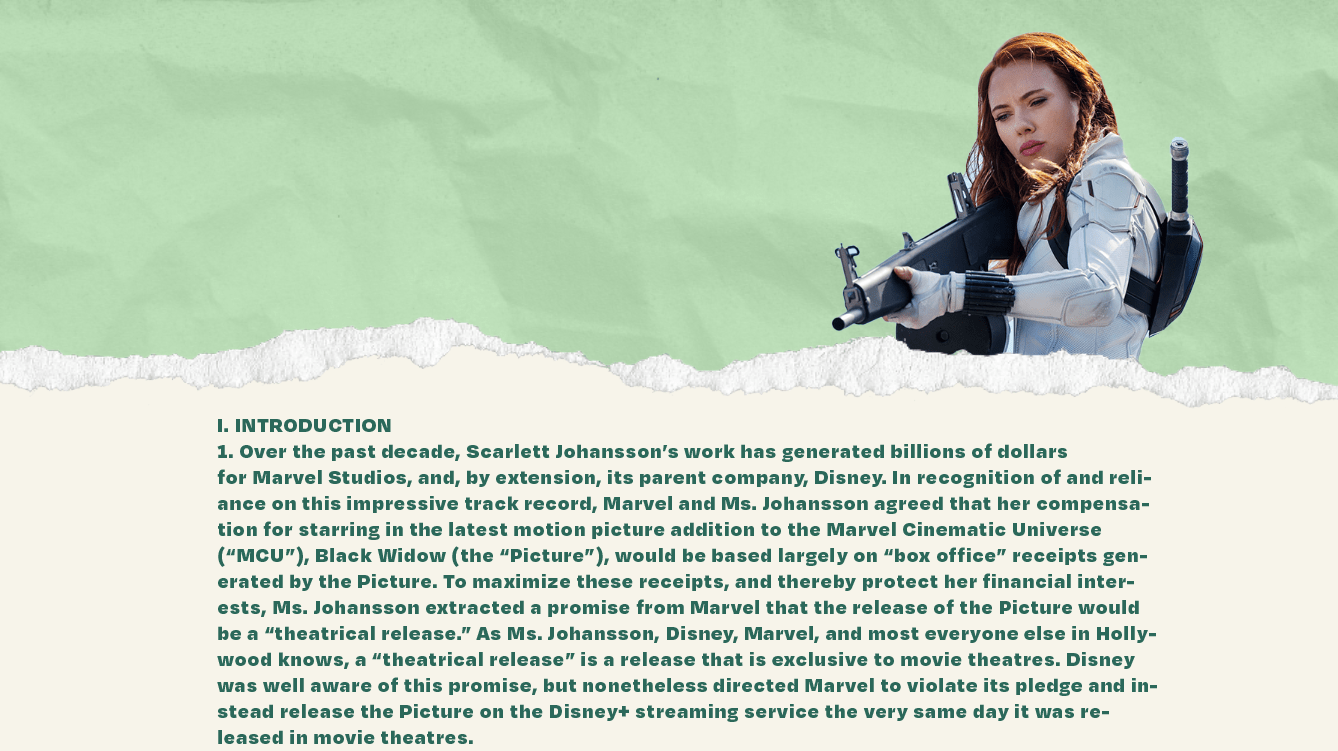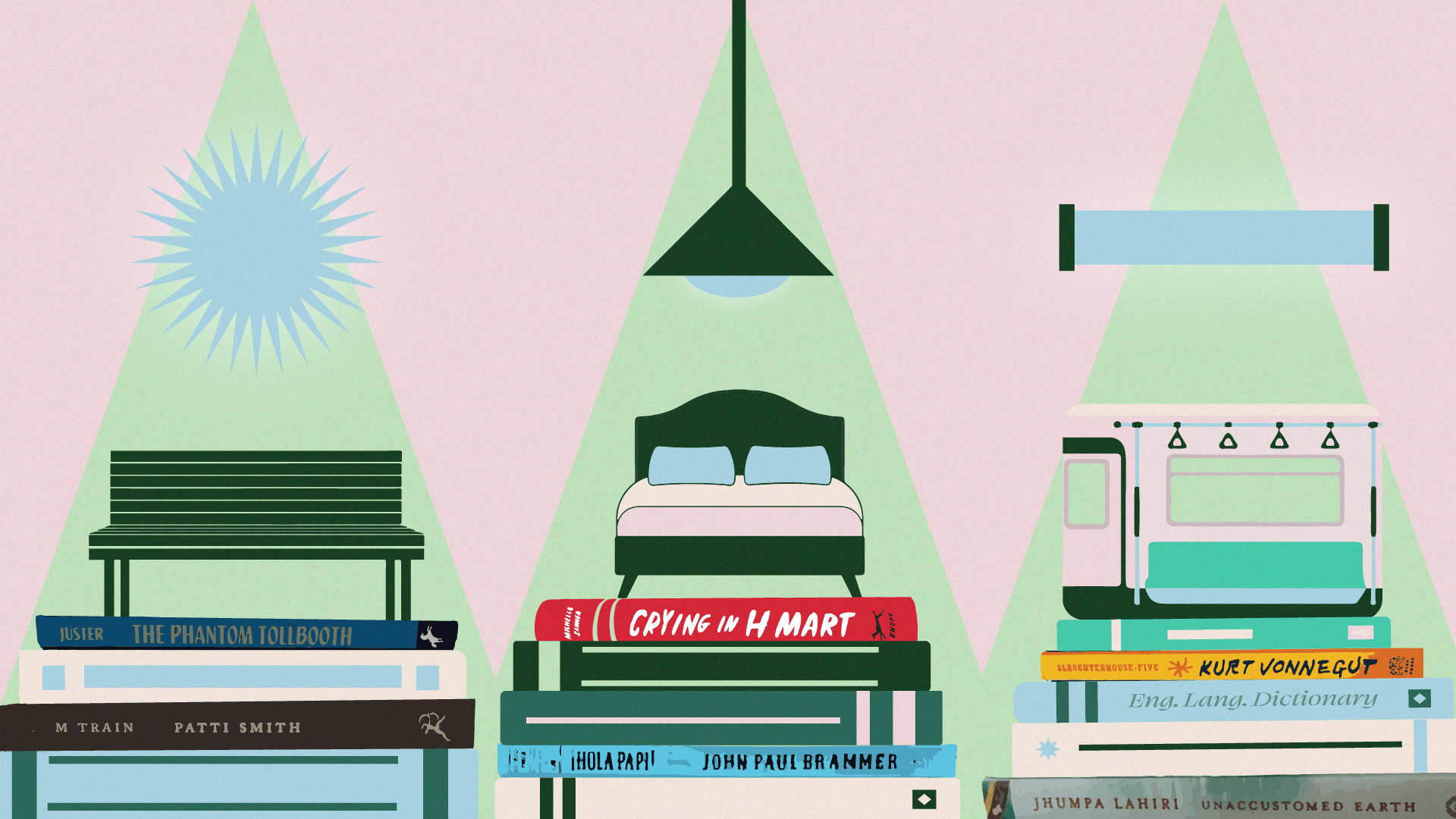
Scarlett Johansson’s Disney Lawsuit Could Define the Future of Hollywood
The worst person you know just made a great point.
At long last, the movies are back, and there’s something for everyone. You could check out the gorgeous, beguiling fantasy of The Green Knight, or take a trip to the beach for Old’s existential horror show. Why, there’s even a good old-fashioned courtroom drama in Scarlett Johansson V. The Walt Disney Company!
The news that Black Widow star Scarlett Johansson was suing Black Widow distributor Disney didn’t come as much of a surprise on Thursday. In the wake of a global pandemic that has decimated the theater industry, plenty of other movie stars have already clashed with trigger-happy executives eager to push blockbusters onto fledgling streaming platforms. Back in May, news broke that Emily Blunt and John Krasinski were engaged in a similar conflict with Paramount over A Quiet Place Part II’s “Paramount+” debut. (I place the term “Paramount+” in quotation marks because I have yet to be presented with any convincing evidence it is a real platform that exists.) And when Warner Bros. abruptly announced it would be dropping its entire 2021 release schedule simultaneously in theaters and on HBO Max, the company was forced to renegotiate nearly every contract on the books, including a hefty $20 million payout to Denzel Washington. And even as Johansson’s case gets moving, Cruella star Emma Stone is considering a lawsuit of her own. As Hollywood moves into a streaming-happy future, the massive publicity these cases provide could have enormous ramifications.
For stars of Washington and Johansson’s caliber, paychecks can come in twos: One before the film is released, and sometimes also one after, as an added bonus for a film’s successful box office performance. Robert Downey Jr. made $75 million in 2019 for Avengers: Endgame alone; other stars, including Johansson, are awarded smaller bonuses after their films reach $700 million at the worldwide box office. But at the rate Black Widow is going — it may not even reach $400 million worldwide after an enormous second- and third-weekend drop — the new film won’t come anywhere near that number. To hear Johansson’s legal team tell it, the simultaneous release of Black Widow in theaters and as a $30 a la carte option on Disney+ has caused the film’s box office to crater, cutting severely into its star’s paycheck.
I know, I know: Boo-hoo, right? Scarlett Johansson is a person so rich she’s married to a sentient money clip; who cares if she only made 20 million bucks on a movie that looks like one of the off-brand Street Fighter games they put outside the mall bathroom? But the stakes here are far larger than the contents of the Jost-hansson checking account.
If streaming continues to play a massive role in Hollywood economics, an obvious truth is only going to become more apparent: Streaming offers executives vast new opportunities to screw hard-working craftspeople out of their paycheck. Viewership numbers are rarely made public; it seems clear that Disney only announced Black Widow’s $60 million Disney+ draw to distract from its lackluster box-office numbers. Because of that, it’s even more difficult to extract the fair compensation that was commonplace when TV ratings, syndication deals, and box-office figures were a matter of public record. It’s taken years for unions like the Writers and Directors Guilds to extract fair residual rates from streaming services.
Even before it arrived in the world of streaming, Disney loved to skimp on residuals, paying creators of Marvel characters only a pittance and ignoring longtime Star Wars authors altogether. Its treatment of Johansson is only the next step. A cursory glance at the court filing (which I highly recommend, if only so you can read the words “Of course, this was Disney’s plan all along” for yourself) shows that a Marvel lawyer promised to renegotiate Johansson’s contract in the event that Black Widow debuted on Disney+. No such renegotiation occurred. I am admittedly not a legal expert, but to me, that sounds like a pretty clear breach of contract (other outlets believe differently).
Disney’s response implies the company isn’t going down without a fight, accusing Johansson of “callous disregard for the horrific and prolonged global effects of the COVID-19 pandemic.” It’s almost too on the nose, blatantly leveraging the tragedy of the last year into an excuse for a continued march towards a tangibly worse world. In Disney’s case, that march means a flattening of culture, a world where the vault shuts on the many classic films it now owns and a glut of mediocre slush replaces them. It means massive tourist attractions open in the middle of a global pandemic, and films where even ordinary settings like restaurants and hotel rooms exist completely digitized, all the better to take advantage of non-unionized visual effects houses. It means ignoring the needs of the theatre industry in favor of its bottom line, and juicing its stock market price with an endless parade of bloodless franchise announcements. It means laying off 32,000 employees in the middle of a global pandemic while executives make millions.
At the end of the day, in spite of all of the sordid Hollywood economics, the conflict here is relatively simple. Scarlett Johansson, whatever you may think of her, is on some level an artist. Her corporate bosses, who decided to use her long-awaited film to advertise their streaming service so that it might someday make a profit, are not. There may not be any heroes in this particular courtroom drama, but it’s very clear who the villains are.


